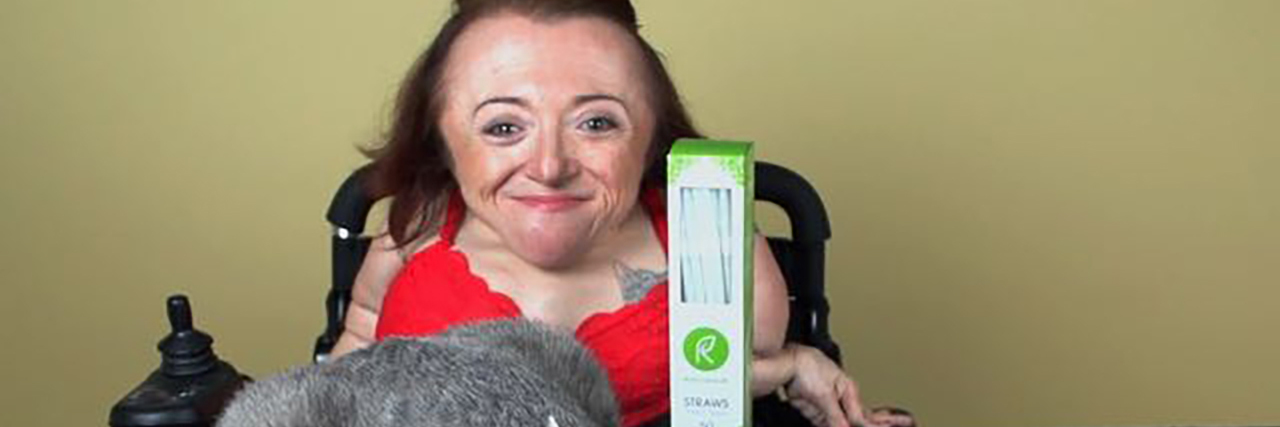My Solution to the Plastic Straw Problem as a Disabled Environmentalist
It was just a regular morning… a hot cup of tea in one hand and scrolling through Facebook with the other. On this particular morning though, my newsfeed was flooded with articles about Starbucks’ plans to ban single-use plastic straws and replace them with strawless lids.
This is too ableist to be true, I thought. Lots of disabled people, including me, can’t safely use one of those strawless lids. I would either wear half my beverage and potentially burn myself or aspirate.
I had a hard time accepting what I was reading because even though Starbucks has had their share of embarrassing moments, they are generally socially conscious. They provide their employees with extensive diversity training that I would expect includes methods of avoiding ableism.
With a sigh of reluctance, I set my tea down and did some research on the matter. That is how I learned that the “straw ban” went far beyond America’s favorite designer coffee retailer. Several major hotels, airlines and family vacation resorts are embracing this growing trend in a collective effort to reduce the amount of plastic straws that end up polluting our environment.
The more I read, the more I felt sick and angry. Like many people with disabilities, I am tired of my needs being an afterthought. We are the largest minority in the world yet none of these CEOs or environmentalists took the time to reach out to us beforehand and ask what kind of impact a global movement like this would have on our quality of life.
In addition, I felt strangely conflicted. My two primary passions that my whole life revolves around are advocating for the equality of people with disabilities, and empowering others to achieve optimal health by utilizing the many resources found in nature. As a Certified Natural Health Professional, I am keenly aware that pollution in our environment has a direct impact on our overall health. If the soil our food is grown in and the water supply we drink from is polluted then we will not be able to maintain optimal health, which is already a challenge for those living with chronic illness and disabilities.
Flexible single-use straws are a medical necessity for some people with disabilities. I have a connective tissue disorder that impairs my strength. At home, I have small cups I can lift so I can consume beverages independently without the risk of injury. This isn’t the case when I’m dining out though. I always need a straw to drink my beverages because the cups and glasses used in most restaurants (and bars) are too heavy for me to lift. Plus, when I am managing a sprained wrist or broken arm, I can’t lift anything.
While a variety of alternatives to plastic straws exist, they have pros and cons and there’s no solution that seems to work for everyone. The debate was getting me so upset that I had to stop and adjust my perspective. Navigating this situation with a scarcity mindset is not going to solve anything. It will only lead to a dead-end debate over which is more important: disabled people vs. the environment.
This may sound like hippy-dippy logic to some, but I am more successful in navigating life when I maintain an abundance mindset. We live on an amazing planet that is so rich in natural resources that we really do not need to rely on products made from toxic materials.
I am grateful my research led me to discover Repurpose compostable straws. These are the only flexible, compostable straw made from plants on the market. This means they have a much lower carbon footprint than their plastic-producing counterparts, so I don’t have to feel guilty about needing to use a straw, which is a relief.
Repurpose even designed its straws with people with disabilities in mind, which is why they have a flexible head. I can honestly say that if I didn’t see a Repurpose straw come directly out of its packaging, I would believe it was made out of regular plastic because of its durability and flexibility. I just hope other industry leaders learn from their forward thinking and innovative example and adopt a similar perspective.
In closing, I think getting rid of the single-use plastic in our lives is a fantastic idea. But it is important that we make this transition with a great deal of thoughtfulness and compassion, because solving one problem by causing another isn’t really solving anything.

